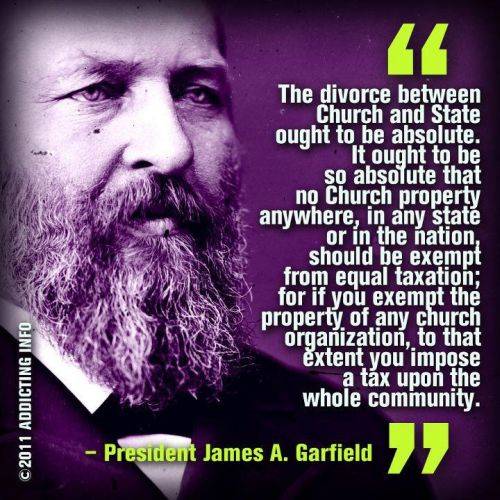both him and Madison had something to do with what the constitution says dont you think?
Irrelevant.
Follow along with the video below to see how to install our site as a web app on your home screen.

Note: This feature currently requires accessing the site using the built-in Safari browser.
both him and Madison had something to do with what the constitution says dont you think?
Madison is known as the father of the constitution.
he wrote most of it.
HE of all people KNOWS what me meant to convey in it.
YOU DONT
Thomas Jefferson - Wikipedia, the free encyclopedia
Thomas Jefferson (April 13, 1743 (April 2, 1743 O.S.) July 4, 1826) was an American Founding Father, the principal author of the Declaration of Independence (1776) and the third President of the United States (18011809).
This is why the republican party hates education
Now ask yourself why your party and Fox teach you to hate the founders ideas?
I might get flamed for this but why can't churches pay their fair share in taxes?
This is why the republican party hates education
I might get flamed for this but why can't churches pay their fair share in taxes?

Mitt Romney: Church State Separation Taken Too Far By Some
Great news for the anti-American rw's who already hate our Constitution.
The U.S. NOT founded upon Christianity
Anyone who argues against "separation of church and state" must realize that their argument applies equally to ALL religions - not just Christianity.


Mitt Romney: Church State Separation Taken Too Far By Some
Great news for the anti-American rw's who already hate our Constitution.
Where's your rep power - numb nuts. Wanna send you something
I might get flamed for this but why can't churches pay their fair share in taxes?
Here is a handy online Constitution resource:
The U.S. Constitution FAQ - The U.S. Constitution Online - USConstitution.net
Mitt Romney: Church State Separation Taken Too Far By Some
Great news for the anti-American rw's who already hate our Constitution.
Where's your rep power - numb nuts. Wanna send you something
Thanks for whining, retard.
Here is a handy online Constitution resource:
The U.S. Constitution FAQ - The U.S. Constitution Online - USConstitution.net
And from your link
Q71. "I cannot find anywhere in the Constitution that refers to separation of church and state."
A. Though many people assume the 1st Amendment sets out some separation, the phrase does not appear in the Constitution. The phrase "wall of separation" appears to have been coined by Jefferson, in speaking of the religious liberties granted by the Constitution and the Bill of Rights. Madison, however, said that there is a line between church and state, not a wall the distinction may or may not be significant.
In practice the separation is more theoretical than actual. In a truly separate society, we would not invoke the name of God on our currency, nor would we speak so highly of our Judeo-Christian values. But we do the fact of the matter is, completely separating religion and government is probably impossible, so long as religion is an important part of the lives of the citizenry. The best we can hope for, and what I think the Constitution tries to protect, is to ensure that there is no discrimination on the basis of religious belief that there be no religion litmus test.
I might get flamed for this but why can't churches pay their fair share in taxes?
I see that point... and I would not oppose churches being taxed... but that is a whole other argument
both him and Madison had something to do with what the constitution says dont you think?